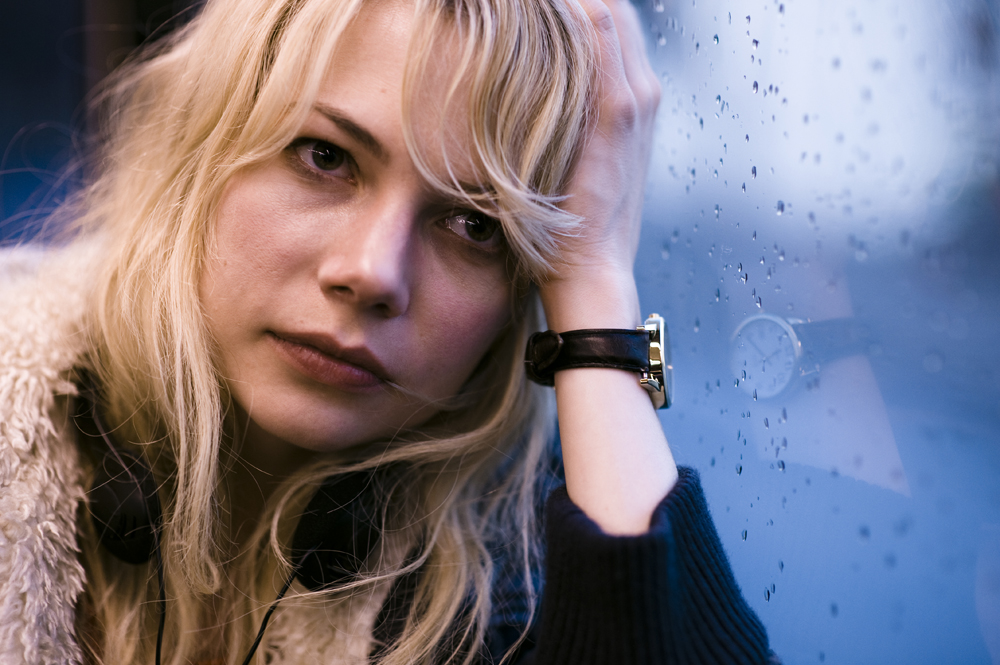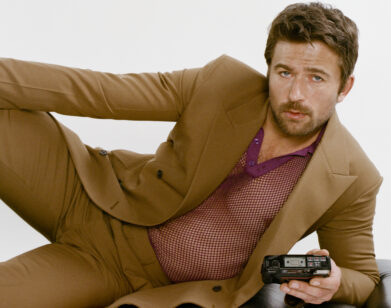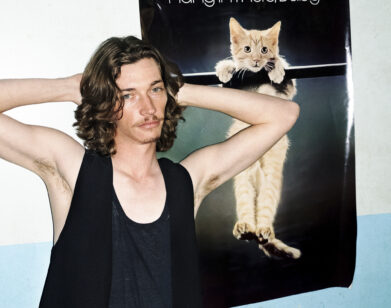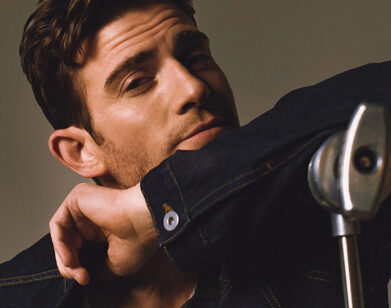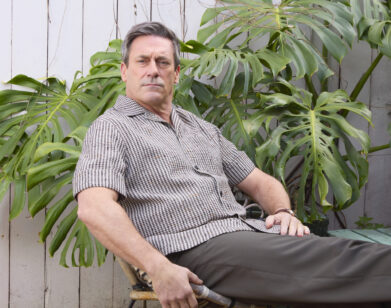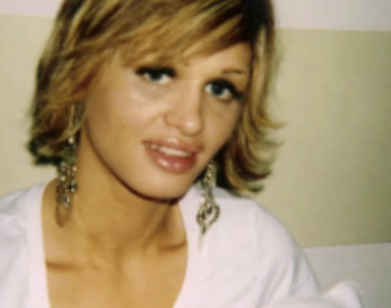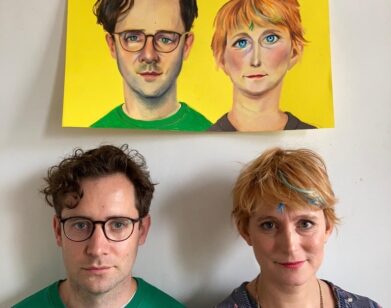Derek Cianfrance
“We actually made a house a home, and I feel like that’s a place where I lived.” Michelle Williams, who was wearing “some” of her platinum Marilyn hair, spoke to us about the intimate and nearly de facto nature of filming Blue Valentine with co-star Ryan Gosling and on-screen daughter, Faith Wladyka. “I would include that in my stops through life, like: ‘Oh yeah, I lived outside of Scranton for a couple months.'” The film, which entailed a twelve-year odyssey for director Derek Cianfrance, tells the two-part story of Dean and Cindy: their quixotic courtship—his ukulele to her tap dance—juxtaposed with the heartbreak of an eroding present.
Often improvising, Gosling and Williams “explored what it was like to fall in love.” Documentary-style, with no do-overs, the past captures those initial moments of sweet inseparability: entwined on a bus, listening to a song together for the first time, making promises. Williams noted, “It was liberating. I didn’t want to make the present. I think I actually legitimately petitioned Derek and said, ‘Can we please not, I don’t want to make the rest of the movie. We have a lot of footage here. Let’s just make a movie and call it Valentine.'”
The cast took one month off of shooting to wear the couple’s marriage and effect six years of physical change. They lived in a house, planned a budget, went grocery shopping, made a bet on who could gain more weight, did the dishes, and celebrated Christmas. “I mean, it was a relief, you’re always trying to pretend that you don’t know what’s going to happen when you’re an actor. And it’s nice, and great directing, because [Cianfrance] asks you to act as a last resort. If you live as them for long enough, you start to feel like you are them,” Gosling told Interview.
We originally met Derek Cianfrance at a Blue Valentine screening hosted at the Core Club by Peggy Siegal, nearly a month before we spoke to him again. We continued our conversation with Cianfrance just a few days before the MPAA overturned its surprise NC-17 rating for the film to an R, and he shared with us his own impressions of what it means to be a filmmaker now.
DURGA CHEW-BOSE: How’s it going?
DEREK CIANFRANCE: It’s going good. I feel like a hamster in its wheel, you know? But it’s cool; I’m not going to complain about it. It’s a nice problem to have.
CHEW-BOSE: So let’s skip talking about the NC-17 rating, and move onto the movie itself.
CIANFRANCE: I know. It’s pissing me off, ’cause it’s distracting from the movie.
CHEW-BOSE: Can you talk a bit about the twelve years it took to make Blue Valentine? It’s not a historical drama, where facts essentially stay the same and where the story rarely shifts, so how did you sustain your original push to make this movie? Over twelve years, how did you continue to tell yourself that this project was worth it?
CIANFRANCE: I think over that time, you’re dreaming. I mean, there’s a fine line between dreaming and delusion, you know. So you’re constantly trying to not be crazy and believe in it. As you change, your dreams change. So the first incarnation of the movie is not the sixty-sixth incarnation of the movie, but it’s very similar. It’s still the same heart and soul; do you know what I mean? The story is very similar, but what changed in those years was, I think, the artifice was stripped off. And it became more and more honest and more and more real, and I went inside of it more. I became more and more vulnerable with it and open with it, and [willing] to take off all of the movie stuff. I took out the façade, the artifice, the archetypes; I took all of that out.
I think it’s life experience. Twelve years ago, I didn’t have a wife or kids, and now I do. How could I make this story without having that experience? And I realized that maybe some of my inspirations, back before I had more life experience, maybe all of those inspirations were all about the movies. And you know, I was writing scenes that had already existed before. It’s like I was programmed by the movies to write that scene in there. And over those years, I was about to take those scenes away or break them on the floor. Like Dean and Cindy used to meet at a carnival, you know, on a Ferris wheel. And that’s, like, ridiculous! That would be so bad if that happened, because…
CHEW-BOSE: That’s exactly like The Notebook…
CIANFRANCE: Yeah, exactly. And when I saw The Notebook, I said “What the hell is going on here?” You know and it’s so corny, whatever… And you know what, that movie is a satisfying movie. But I’m so thankful that I didn’t make [Blue Valentine] back then, twelve years ago. It wouldn’t have been what it is now. For me, the key in those twelve years was that I let it live. And I think—you said about a historical drama that [it] doesn’t change—I don’t think I could have stuck with something historical for twelve years, because it’s not changing, but I am changing. This movie changed while I changed. Does that make sense? It stayed fluid. When I started shooting it, the seed of the idea was the same, but it was totally different.
CHEW-BOSE: And watching it now? It was in flux for so long, and now it’s final—is it hard to watch it at times, because your inclination is to keep looking at it and fixing it?
CIANFRANCE: No, ’cause now it’s alive! You know, I hate scripts because they’re basically ideas, they don’t exist. It’s like a comic book where someone has that thought bubble above their head. You know what I mean? It’s tough to smoke. And what’s important in movies is to execute and to make them real. So now this movie is real, and it has a life, and I look at it, and I don’t have regrets with it. I feel like the moments are alive, and it’s surprising to me.
CHEW-BOSE: When I asked Ryan about what that was like, to shoot without always knowing what was going to happen—especially since you often took both him and Michelle aside and gave them separate directions, just to see what would happen—he took a deep breath, sighed, and said it was a relief working like that.
CIANFRANCE: Yeah, I told Ryan and Michelle on the first day of shooting that I had written sixty-six drafts of the script, but if they only stuck to the script I would be so bored. I told them to break it.
CHEW-BOSE: When you and I first met, we had talked about movies that Blue Valentine reminded me of, reminded you of, and some of your influences in making this film.
CIANFRANCE: Yeah, yeah, I remember. You love movies, I remember. Tell me about that again.
CHEW-BOSE: Well, we talked about that four-minute scene in A Woman Under the Influence where Mabel is waiting for her kids on the school bus.
CIANFRANCE: Yeah, that’s the best.
CHEW-BOSE: And when [Gena Rowlands] starts jumping in the street as the bus arrives and as the music gets louder, that sort of desperate happiness, both Michelle and Ryan embody it—that immediacy—in most of Blue Valentine.
CIANFRANCE: Cassavetes’s influence is all over the movie. I mean, I watched his movies, all of his movies, countless times. The thing I love so much about his movies is how they would change, how they always felt like they were alive. Like A Woman Under the Influence, the first time I saw it I thought it was a movie about a crazy woman, and then when I saw it last year for the twenty-fifth time, I realized she was the only sane person in the whole movie. And I love that about a movie, and I tried to replicate that in Blue Valentine and allow people to have their own interpretations of the characters. You know, people pick sides with this movie.
When you see somebody like Cassavetes do something, I don’t feel like, “Oh man, he did it already.” I feel like, “Wow, it’s possible.” You don’t try to copy those scenes; you just try to take the spirit of them to know that it’s possible, to be brave and personal. And the best thing about that film is that it’s his wife, his kids. That scene where his kids are really getting off of the school bus, were they really coming from school? I bet. I bet they just set it up. Or maybe it’s not, you know, I guarantee that lady on the street who [Rowlands] asks for the time is probably not an actor. I love that in his movies, that it doesn’t seems like he’s trying to keep the outside world out of it. I go down the street in New York City and I see these productions, and there’s forty trucks, and the streets are blocked off, and I look and they’re shooting a close-up. All the life is gone. And Cassavetes included the life, and that became my inspiration.
CHEW-BOSE: A lot of people are drawn to the movies because they offer a sense of hope. And in Blue Valentine, when Cindy and Dean’s marriage reaches its most desperate points, there is still that sense that they love each other deeply. Could you share with me a couple moments that you find most hopeful in Blue Valentine?
CIANFRANCE: Yeah, this movie is a duet. It’s equal parts man and woman, past and present, love and hate. You can’t have one without the other; this movie relies on contrast. I find the ending to be hopeful, because there is recognition at the end of this film, of a problem, of a disease between these two people. I think it’s hopeful, because once you recognize it, you can overcome it. If there’s never a recognition, then it never changes, and the disease continues on. I grew up in a house where there was a lot of arguing, and I argue all the time, and I can’t stand to have things buried. I think Dean and Cindy in this movie, when we first see them in the present, they’ve been burying a lot. And at the end of the movie, it comes out. It’s not pretty, it’s painful, because they let it go too long. These things always come out. The longer you make it wait, the more brutal and violent it’s going to be. But to me, that’s hopeful, because they get to there.
Another hopeful moment, I believe in all the moments of love. The scene on the street where they tap-dance and play the ukulele: that’s hope. We all are programmed by these fantasy movies of this never and forever. If Dean and Cindy don’t make it, and if they never get back together, then they had it. It’s okay. To have it for a day is better than never finding it at all. And the hope is the kid, in Frankie, you know.
CHEW-BOSE: Yeah, I just met [Faith Wladyka] upstairs.
CIANFRANCE: Did you interview her?
CHEW-BOSE: No, I was just watching SpongeBob with her in the press suite.
CIANFRANCE: She’s really great. She’s a kid, not one of these perfect little actresses.
CHEW-BOSE: You once mentioned that you had had other actors in mind for the roles of Cindy and Dean, especially since this project has lasted more than a decade. You mentioned Ashley Judd and Benicio del Toro…
CIANFRANCE: I mean, they never got the script.
CHEW-BOSE: Looking back on who you might have had in mind, even if it was casually, what about Ryan and Michelle makes it impossible for anyone else to have played this couple?
CIANFRANCE: I just think it’s like falling in love with someone. There’s no reason for it, there’s no checklist, it’s just meant to be. When I met Michelle, and when I met Ryan, it was exactly the same. It was there. I met her in 2003 and I met him in 2005, and a dialogue started immediately between us. We always had to make this film. Sometimes maybe our life wasn’t in the right spot to do it, but we always had that love. And eventually everything worked out.
CHEW-BOSE: You’ve set this crazy, almost cosmic standard for your future movies.
CIANFRANCE: Yeah, I know, tell me about it. [LAUGHS] I hope it doesn’t mean I have to spend twelve years like that. I used to think about a chess game when I was making Blue Valentine, like “Damn, this is ten thousand moves and the game is still going. How am I going to win this game?” I kept thinking to myself that I’m learning so much that maybe the next game, I’ll only have to do a thousand moves to win it. But you know, what I’m interested in is longevity. The artists that I respect and admire are those that continued to make interesting work late into their careers. Like Elem Klimov, who did Come and See, or Tom Waits or Neil Young, or the artist Dan Clowes, you know, people that continue to grow. I’m so pumped that people love Blue Valentine and that it’s being taken on by our generation as a love story that they relate to. And I’m just going to keep trying to make my films and trying to make them the most honest way I can. If it doesn’t feel right, then I won’t do it. That’s the key.
CHEW-BOSE: There hasn’t been a relationship movie like this, at least in American film, in a long time. What place does it have now? What about Cindy and Dean’s relationship makes this movie important now?
CIANFRANCE: I think it’s the job of the artist to put new things out there. We tried to make a movie about a relationship and not exploit or sensationalize it. It’s not manipulative. There’s a back-and-forth to it. I think most of all, it respects its audience. I spent twelve years as an audience member. I was just sitting at the movies, wanting to see Blue Valentine on the screen and not seeing it. I think as an audience member, I respect the audience, and I wanted to make a movie for them, that would reflect them and not talk down to them. I wanted to make a specific story, but also keep it open so there was room for them to come in. And so when the movie’s over, they can still have it. Like a Cassavetes movie. They never leave you.
BLUE VALENTINE WILL BE RELEASED NATIONALLY ON DECEMBER 31.

